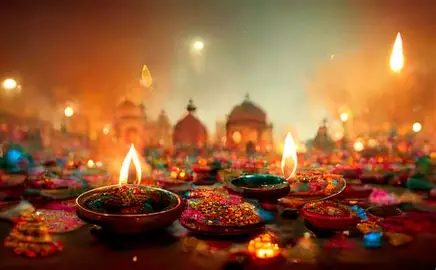Diwali, also known as Deepavali, is India’s most cherished festival, celebrated with grandeur and joy across the country and by Indian communities worldwide. Rooted in ancient traditions, Diwali symbolizes the triumph of light over darkness and good over evil.
The festival spans five days, each with its own significance. It begins with Dhanteras, a day for purchasing gold and new items to invite prosperity. Choti Diwali follows, setting the stage for the main celebration. The third day, Diwali, is the heart of the festival, marked by Lakshmi Puja, where devotees worship the goddess of wealth. The fourth day, Govardhan Puja, honors Lord Krishna, and the final day, Bhai Dooj, celebrates the bond between siblings.
Homes are cleaned and adorned with rangoli, candles, and oil lamps (diyas), creating a warm and inviting atmosphere. Fireworks light up the night sky, and families exchange sweets and gifts, reinforcing bonds of love and togetherness. Popular treats include laddoos, barfis, and chaklis.
Diwali is not just a religious celebration—it’s a cultural phenomenon. It encourages reflection, renewal, and generosity. Many people use this time to forgive past grievances, start new ventures, and donate to those in need.
In recent years, there’s been a growing emphasis on eco-friendly Diwali, with quieter fireworks, sustainable decorations, and digital greetings gaining popularity.
Ultimately, Diwali is a celebration of inner light—the hope, kindness, and wisdom that guide us through life. As diyas flicker in every home, they remind us to shine brightly, no matter the darkness around us.

